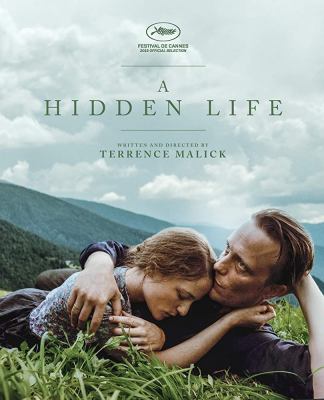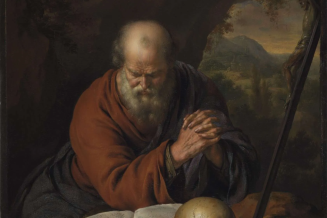Film 'A Hidden Life' - Not hidden from the peace movement

Austrian Franz Jagerstatter has long been inspirational to the peace movement. So, it is wonderful to see the life of this World War II conscientious objector revealed to the world through a new film, 'A Hidden Life'. It is written and directed by acclaimed director Terrence Malick, and has been described as "masterpiece" and "one of the most thought-provoking films of 2019". From the start, I was transported to a small village in scenic Upper Austria where the film's dramatic events took place between 1939 and 1943. They were familiar to me, and they unfolded faithful to the true events.
Every year, at the anniversary of Franz's execution on 9 August 1943, a memorial service is held in London to mark the beheading by guillotine of 36-year-old Franz for his refusal to take an oath of loyalty to Hitler.
He was beatified in 2007 after a long campaign by Pax Christi and other peace groups to recognise his witness for peace.
Last year was the 30th annual gathering and around 50 people assembled in the crypt of Westminster Cathedral, for ecumenical prayers. We heard Mass being concluded above us in the main body of the church. Our own service - which felt like it was on the periphery - has always been lay led. Several people around the crypt had spent time in prison for nonviolent direct action for peace and the service included a calling out of names of conscientious objectors.
The annual service also remembers the victims of the atomic bomb which was dropped on the Japanese city of Nagasaki on 9 August 1945, killing at least 74,000 people. Compassion for the innocent victims of war ties in with the concerns of Franz. Candles were lit as a sign of hope amidst the darkness of war and violence.
Franz - played in the film with great dignity, gentleness and resoluteness by German actor August Diehl - wrote regularly to his wife Franziska (Valerie Pachner) from prison, and their correspondence over the years forms the bulk of A Hidden Life's reflective voiceovers. Since it starts in 1939 it does not record the wildness of the young Franz whose great love was his motorbike and who fathered an illegitimate child. He was an unlikely martyr and saint.
The film highlights his happy marriage to Franziska, and that by 1943 they had three little girls, but storm clouds gathered - literally above the village - when Franz, inspired by the couple's Catholic faith, took the lonely path of resistance. He had decided it was impossible as a Catholic to obey a dictator who was, in his words, "killing innocent people, raiding other countries, preying on the weak". He consulted parish clergy and the local bishop - all of whom advised him to compromise. There was resistance in the Church to the Nazi regime but it was thin and patchy. Franziska alone supported Franz to the end. After the war, Franz's name was added to the memorial in his parish cemetery of those who had died for Austria but it was secretly erased by villagers who viewed him as a traitor. His family was shunned for years and a pension for his widow was not approved until 1950.
Franziska outlived Franz by more than 70 years, dying in 2013 at the age of 100. Franziska's funeral was in St Ragegund where she had been sacristan of the church for 30 years, a role she took over from her husband in 1944. Some in Pax Christi had met her. Valerie Flessati of Pax Christi UK says that, "when we were in Linz Cathedral for his beatification in 2007 the entire congregation gave her a standing ovation in unspoken recognition of her own sanctity and much longer sacrifice". Bruce Kent adds that, "meeting Franz's wife Franziska, as I did several times, was always so moving; a quiet woman with the twinkle in her eye, I could not fail to think each time of the terrible pain of that separation and execution in 1943". He takes the view that, "hers was a long life of great faith matched with equal hope" and "to me and many she is as much Blessed as her martyr husband".
But back to the film..
We first meet Franz and Franziska picking wildflowers and playing games with their three daughters on a scenic hillside near St Radegund. The backdrop contrasts shockingly with the stark prisons where he was incarcerated as the war progressed. Yet, even here, we see Franz appreciating a patch of green grass growing through concrete in the prison yard. He is clearly a man close to God and God's creation.
Watching this film is a spiritual experience. The title is taken from George Eliot's Middlemarch: "The growing good of the world is partly dependent on unhistoric acts; and that things are not so ill with you and me as they might have been, is half owing to the number who lived faithfully a hidden life, and rest in unvisited tombs." Franz and Franziska's lives are hidden no more and indeed their graves at St Radegund receive visitors from around the world. I did wonder how the film would be viewed by people who knew nothing of his story or of conscientious objection during both wars, which is itself a hidden history. I viewed it with two other Pax Christi members and for us it was meaningful, life affirming and engaging, although three hours long.
The beautiful cinematography of the Alpine landscapes - seen to full effect on the big screen - provide a spectacular backdrop. Franz's greatness is a reflection of the majestic mountains he grew up in. James Newton Howard's exquisite musical score reflects the love and faith within the Jagerstatter family, especially moving when interspersed with Franz's reflections. The film is poetic in its beauty and the heightening of emotions and sensations. One reviewer suggests Mallick uses the camera like a poet uses his pen. It highlights poignantly how simple lives in the remotest of places are destroyed by war.
Malick's poignant WWII conscientious objector drama and powerful tale of quiet resistance resonates with our own time. How do we challenge leaders whom we perceive to behave in a manner inconsistent with the values of our faith? What can we do to resist war when the prevailing mood in a country is to support it or be indifferent to it? In one of his interviews, August Diehl suggests that we learn from Franz that "a No is enough to change the world". It is particularly poignant coming from an actor who first came to international attention a decade ago in a role as a major in the Gestapo.
Blessed Franz Jagerstatter was already a hero to the peace movement. Perhaps with the new film his story will prompt a wider discussion about peacemaking today, in the Church and in the world.
See also: ICN 5 December 2019 Vatican screening for 'A Hidden Life' + trailer: www.indcatholicnews.com/news/38468


















